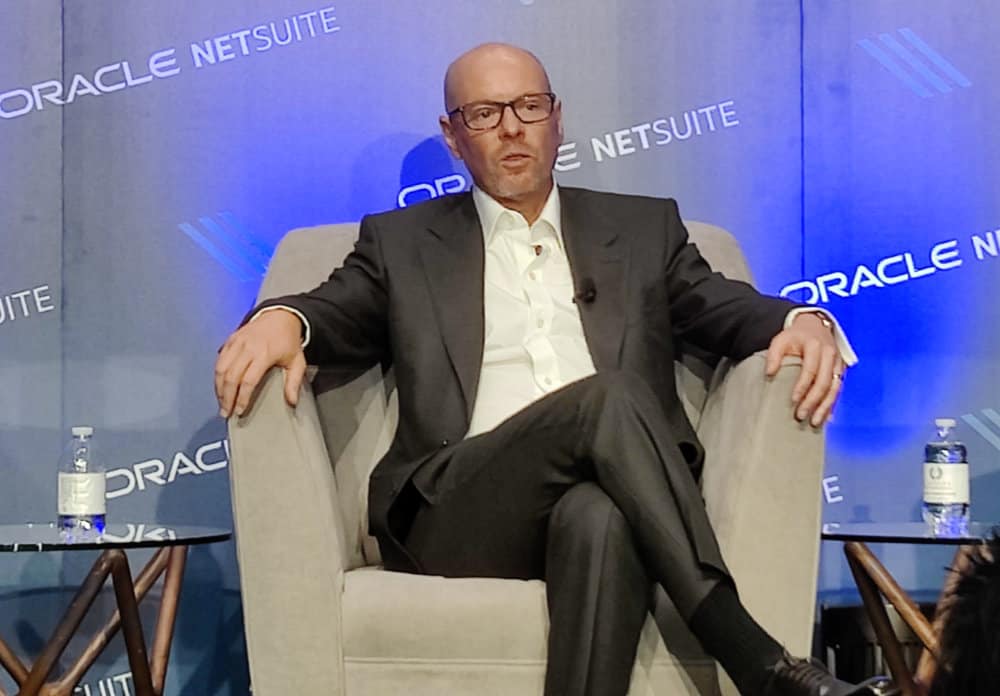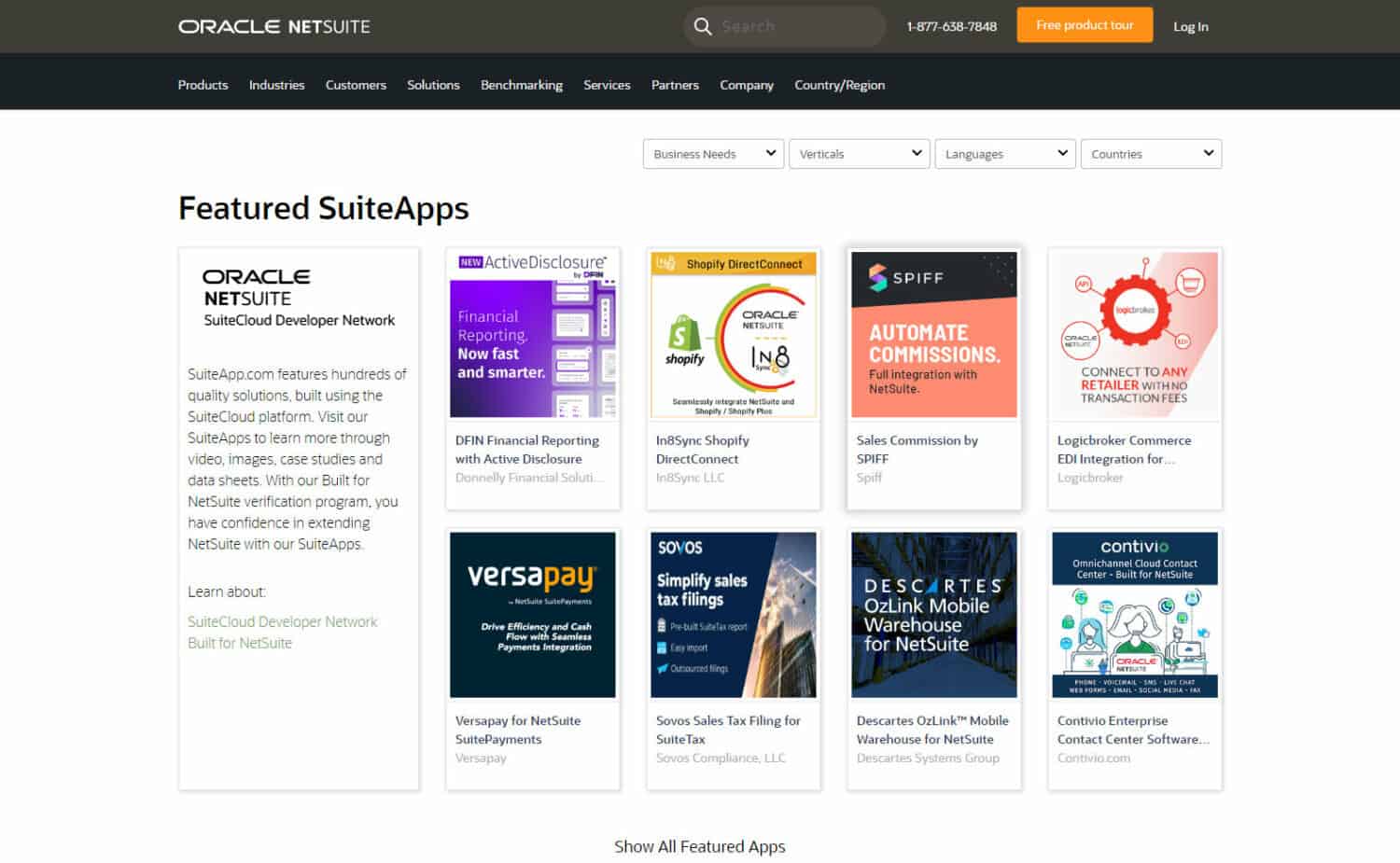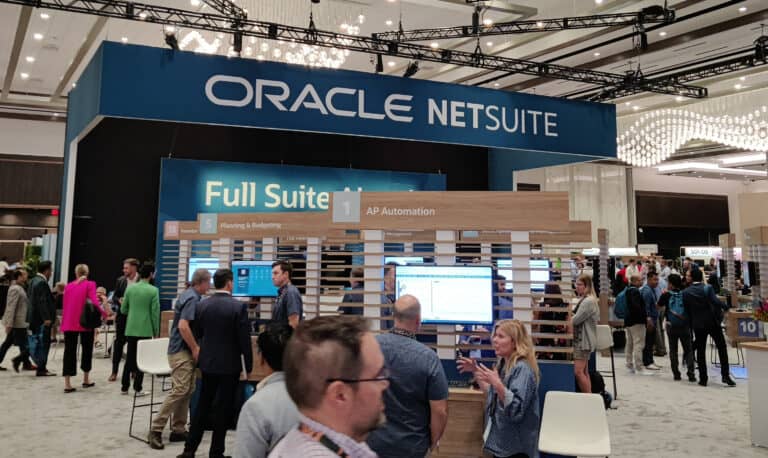The NetSuite ERP platform is becoming hard for many SMBs to ignore. This year there was another SuiteWorld conference, where the company once again announced some major enhancements. As an SMB with an ERP need, NetSuite is a serious candidate today. Especially because it is also affordable.
Many small growing organizations struggle with choosing the right IT solutions to accelerate their growth. There are many IT solutions in local markets with strong brands, but the technology is sometimes dated or limited. According to the sales departments of those local players, anything is possible, but things often go wrong during the implementation phase. They run into the legacy and limitations of the ERP or finance solutions. By then, contracts have already been signed and there is no turning back.
The NetSuite ERP-platform is extended with many applications and industry specialisation. This doesn’t mean NetSuite is the answer for every organization. But the platform is in many areas further ahead than many local players. Should it still not offer what you are looking for, the platform can also be highly customized or extended through low-code.
For which organizations is NetSuite suitable?
If you start dissecting the NetSuite platform, the basis is an ERP platform surrounded by applications that function on top of that ERP platform. All from the cloud and right in your browser. The fact that all applications run on top of the standard ERP platform is a big advantage for SMBs. This allows all applications to integrate seamlessly with each other, which saves a lot of extra work. NetSuite has been part of Oracle for a number of years and has gained a large international focus. However, we do see that many applications are still available first in the United States and much later in Europe.
The biggest disadvantage of a solution like NetSuite compared to a local player is the integration with local organizations. For this, one often has to resort to partners or integration specialists such as Boomi. For example, integration with local banks or the tax authorities is hard for NetSuite in local markets.
NetSuite is mainly for organizations looking for a solution for order management, warehouse management, inventory management, manufacturing, e-commerce or IT solutions that sell subscriptions. In addition, NetSuite also has strong applications for finance, HR, payrolling and procurement.
Automate processes and maintain real-time visibility
Most organizations know when they are ready for a new or better ERP solution. For example, if you currently have an ERP solution, but pay thousands of dollars annually to consultants to keep things working. Or if your employees have to do far too many processes by hand that really should be automated. Such things cause your company to slow down in terms of development and growth and not be able to take big steps forward. You ultimately want your growth to accelerate.
NetSuite offers the ability to automate processes, even if you don’t realize that this is possible in certain cases. If your employees within NetSuite keep doing the same action, the platform automatically asks if you want to automate those actions with a workflow. You can also automate processes yourself, but sometimes it’s helpful if the platform suggests it.
The more you can automate, the more your business processes accelerate. It becomes easier to accelerate growth. Another benefit of Oracle’s acquisition of NetSuite is that NetSuite can now use Oracle technology. For example, it has embraced Oracle’s Autonomous Database, which now allows it to provide a very comprehensive analytics tool. All actions and processes that run through NetSuite that affect inventory or finances are viewable in real-time. So you don’t have a once-a-day moment when all the reports become available. You know continuously how you are doing because everything is displayed in real-time.
It offers a number of additional benefits. For example, problems can be detected and resolved earlier. Think of problems in inventory or order management. Say you sell bicycles, but a particular model is sold out and the supplier can’t deliver for a while. From the NetSuite console, you can easily email all customers with outstanding orders for that particular bike. You can, for example, recommend a different model at a discount or offer customers the option to get their money back instantly.
SuiteSuccess provides industry specialisation
NetSuite is certainly not for every company. There also comes a time for very large companies when NetSuite is no longer adequate. However, we think NetSuite can certainly make a big difference in SMBs. We have written about SuiteSuccess in the past. When a company chooses to use NetSuite, the implementation actually always starts with a SuiteSucces template. These are industry-specific templates that the company has developed based on best practices with existing customers. All the experiences and processes it has seen at customers in an industry come together in a SuiteSucces template.
By using such a template when implementing the ERP platform, the customer immediately gets a well-configured customized ERP environment. It will never match a 100 percent with what the customer wants. But if you can get 70 or 80 percent with the template, you have already delivered a lot of “customization” by default.
A part of the customization you will always keep, because every company is different. Companies differ in strategy, or in payment model, or the way products are delivered. In an implementation process, it is especially important to work with the customer to see how that template is put together. After all, some best practices can also be an improvement of existing business processes for a customer. Often part of the template is customized, but business processes are also adjusted because the process in the template is way more efficient.
NetSuite is affordable
One of the things we often hear is that smaller organizations are unsure which IT solutions are suitable and affordable for them. At NetSuite, they have been shouting for years that they are the ERP for the mid-market, but what exactly is that mid-market? And what price tag does it carry? Nevertheless, this year we pushed to clarify that. For example, we managed to get a starting price from the founder of NetSuite. That way, companies also know whether it fits their budget.

The founder and SVP of NetSuite, Evan Goldberg, was, after some urging, willing to give us a very rough figure to communicate. He did ask us to emphasize that a price depends on many factors, so this is a rough figure. For example, it depends on the customer’s requirements, the number of users and which modules of NetSuite it wants to use.
A small company growing toward the mid-market (usually above a million euros in sales) and getting to the point where ERP becomes important should count on about 10,000 euros in license fees per year. On top of that comes about 10,000 euros to 15,000 euros in implementation costs in the first year.
That’s a serious investment, but less than we expected. In addition, companies often continue to invest in the ERP platform in subsequent years, to add more departments or applications or to further automate business processes. When all is said and done, the ERP system ultimately makes money. Basically by automating processes, thereby saving labor hours. There is also greater insight into processes, inventory and transactions, which helps prevent problems more quickly and save costs. You can deliver a better customer experience, because employees have more time to help customers better. Ultimately, all of these things should accelerate business growth.
NetSuite extensions, implementation and quality control
To better address local markets or specific customer needs, Netsuite has also created its own App Store called SuiteApp. These are applications built by ISV partners. In some cases these applications are built on top of the ERP platform, in other cases they are standalone applications that integrate closely with the NetSuite ERP platform.
SuiteApp contains 628 applications at the time of writing. Given the size of NetSuite, not a huge amount. So during SuiteWorld we went to inquire about the policy behind that application store. We struck up a conversation with Guido Haarmans, Group Vice President Business Development – Technology Partners at NetSuite, and partly responsible for SuiteApps.

He explained to us that SuiteApp is not an open application store. This was deliberately chosen to ensure quality and protect existing partners. ISVs with good ideas are welcome to apply. However, every organization and every plan for an application is first thoroughly reviewed and assessed.
In practice, however, NetSuite mainly looks at what needs there are in certain industries that NetSuite cannot or does not want to fulfill itself, Haarmans said. Then they look for two partners who can offer an application to fill that need. For customers, it is good if there are at least two providers, because then there is a choice and some competition, so applications also get better. On the other hand, NetSuite does not want too many providers. ISV partners must also be able to earn a good living from their offerings in the application store. After all, NetSuite also requires a few things from partners around implementation and quality control. This is only possible if it is also profitable for the partners. If the cake is divided into too small pieces, partners drop out.
When NetSuite comes out with new versions of the ERP platform, it must also have the assurance that everything will continue to work properly. With its own applications, it can guarantee that; with ISV partners’ applications, it is more difficult. That’s why NetSuite makes new versions available to ISV partners early on and requires them to test their applications extensively. Then they must also demonstrate that the applications still work well with the new version of the ERP platform. Only when all 628 applications have demonstrated that they are working properly will NetSuite proceed to roll out a new version.
So it is important that all partners stay involved with NetSuite. That it is profitable for them and competition is kept in check. So when admitting a new ISV partner, they also consider how healthy the company is, how mature the development team is and whether they can meet those quality requirements. So while SuiteApp is a closed application store with limited choice, as a customer you do have the assurance that an application will work well in your ERP environment.
Europe is not first choice for NetSuite
It did become clear to us again during SuiteWorld that Europe is not NetSuite’s first, second or third choice. Often, new solutions appear first in the United States. Depending on how much local market knowledge is required, products then appear in the United Kingdom, Australia, New Zealand and after that in Europe. Why that is, we have not been able to find out. Fortunately, not all solutions require a lot of specific market knowledge, so some come to Europe faster. Financial products in particular often take longer.
NetSuite, as mentioned, has become part of Oracle. As a result, it has a broad footprint in Europe and can also provide support in many countries. However, the number of people working specifically for Netsuite in Europe is limited. NetSuite did not want to mention numbers, but from the answers we received, the focus on Europe can be a lot better. It would be good if NetSuite would change that. NetSuite needs to start developing more actively in Europe. If the products are developed more towards the European market, the ERP platform can also grow faster in Europe.
All in all, we see many opportunities for SMBs with NetSuite and vice versa for NetSuite many opportunities with SMBs, but they have to know how to find each other better.
